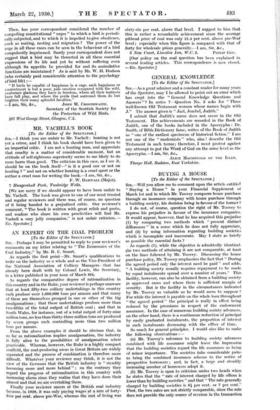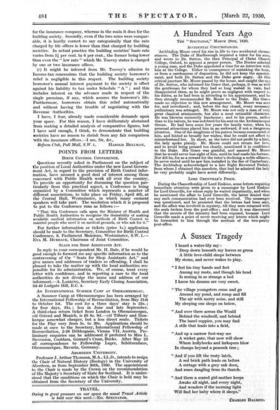BUYING A HOUSE
[To the Editor of the SPECTATOR.] SIR,—Will you allow me to comment upon the article entitled " Buying a House " in your Financial Supplement of March 1st and in which Mr. Toovey compares house purchase through an insurance company with house purchase through a building society, his decision being in favour of the former ?
I do not, of course, question the right of Mr. Toovey to express his prejudice in favour of the insurance companies. It would appear, however, that he has acquired this prejudice (1) by comparing two methods which " present distinct differences " in a sense which he does not fully appreciate, and (2) by using information regarding building societies which is incomplete and inaccurate. May I state as briefly as possible the essential facts ?
. As regards (1), while the objective is admittedly identical. the two methods of attaining it are not comparable, at least on the lines followed by Mr. Toovey. Discussing the house purchase policy, Mr. Toovey emphasizes the fact that " During the agreed period only the interest need be paid " and adds, 't A building society usually requires repayment to be made by equal instalments spread over a number of years." This facility, however, can also be obtained from a building society in approved cases and where there is sufficient margin of security. But is the facility in the circumstances indicated by Mr. Toovey as valuable as he would seem to suppose ? For while the interest is payable on the whole loan throughout " the agreed period " the principal is really in effect being reduced by the prethiums in respect of the endowment assurance. In the case of numerous building society advances, on the other hand, there is a continuous reduction of principal by easily graduated instalments, the proportion of interest in such instalments decreasing with the efflux of time.
So much for general principles. I would also like to make the following observations :-- (a) Mr. Toovey's reference to building society advances combined with life assurance might leave the impression that the building societies regard the life assurance as being of minor importance. The societies take considerable pains to bring the combined insurance scheme to the notice of prospective borrowers ; and, in fact, a large and steadily increasing number of borrowers adopt it.
,(b) Mr. Toovey is open to criticism under, two heads when he states that the " rate of interest charged by life offices is lower than by building societies " and that " The rate generally charged by building societies is 61 per cent. or. 7 per cent." First, the two rates are not strictly comparable, since the rate does not provide the only source of revenue in the transaction for the insurance company, whereas in the main it does for the building society. Secondly, even if the two rates were compar- able, it is hardly correct to say categorically that the rate charged by life offices is lower than that charged by building societies. In actual practice the building societies' basic rate varies from 5i per cent. to 6 per cent., the former being lower than even the " low rate" which Mr. Toovey states is charged by one or two insurance offices.
(c) It might be inferred from Mr. Toovey's allusion to Income-tax concessions that the building society borrower's relief is negligible in this respect. The building society borrower's annual interest payment to the society is offset against his liability to tax under Schedule " A " ; and this includes interest on the advance made in respect of the single premium, if any, which assures the borrower's life. Furthermore, borrowers obtain this relief automatically and without having the trouble of negotiating with the Revenue -Authorities.
I have, I fear, already made considerable demands upon your space. For this reason, I have deliberately abstained from making a detailed analysis of comparative figures, but I have said enough, I think, to demonstrate that building societies have no reason to shrink from any fair comparison 'with the insurance offices.—I am, Sir, &c., Reform Club, Pall Mall, S.117 .1. HAROLD BELLMAN.



















































 Previous page
Previous page